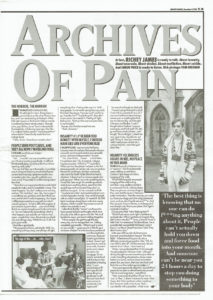 My friend Kate recently lent me her copy of Withdrawn Traces by Leon Noakes and Sara Hawys Roberts. The book is a biography of Richey Edwards aka Richey Manic. It also raises a lot of questions about his disappearance (not least ‘Can you ask too many rhetorical questions?’)
My friend Kate recently lent me her copy of Withdrawn Traces by Leon Noakes and Sara Hawys Roberts. The book is a biography of Richey Edwards aka Richey Manic. It also raises a lot of questions about his disappearance (not least ‘Can you ask too many rhetorical questions?’)
The book quotes from Edward’s archives, which is an incredible experience. I was obsessed with the Manic’s third album, The Holy Bible, during 1994/5. The record is an uncompromising and brutally intellectual record, released as Edwards’ mental health reached crisis point.
At the time, Edwards’ decline was documented by the music press, his scars displayed in powerful black and white photos, his extreme statements cast as pull quotes. The ongoing illness played into rock and roll mythology, which fed the self-destruction of both Richey Manic and some of his fans (as Edwards in turn had taken Kurt Cobain as an influence).
Reading excerpts from his diaries strips away the glamour. The story becomes sadder and the intellectual structures are much less rigorous than they appeared when edited and honed in interviews. Rather than describing the self-sacrifice of a rock star, Withdrawn Traces depicts the sad decline of a human being.
One quote from the book stood out, which originally appeared in the Melody Maker in December 1994:
When you’re in the places I’ve been in, the first place especially, it’s just any job, any occupation. Housewife, bricklayer, plumber, somebody who works for South Wales Electricity Board, whatever. It doesn’t pick or choose people who pick up a pen… It’s very romantic to think ‘I’m a tortured writer’, but mental institutions are not full of people in bands.
The mythic nature of rock and roll, with it’s doomed genius archetypes doesn’t translate into real life – even for the people enacting those archetypes. The book was heartbreaking, but a powerful insight into much of what was happening behind the scenes in 1994/5.